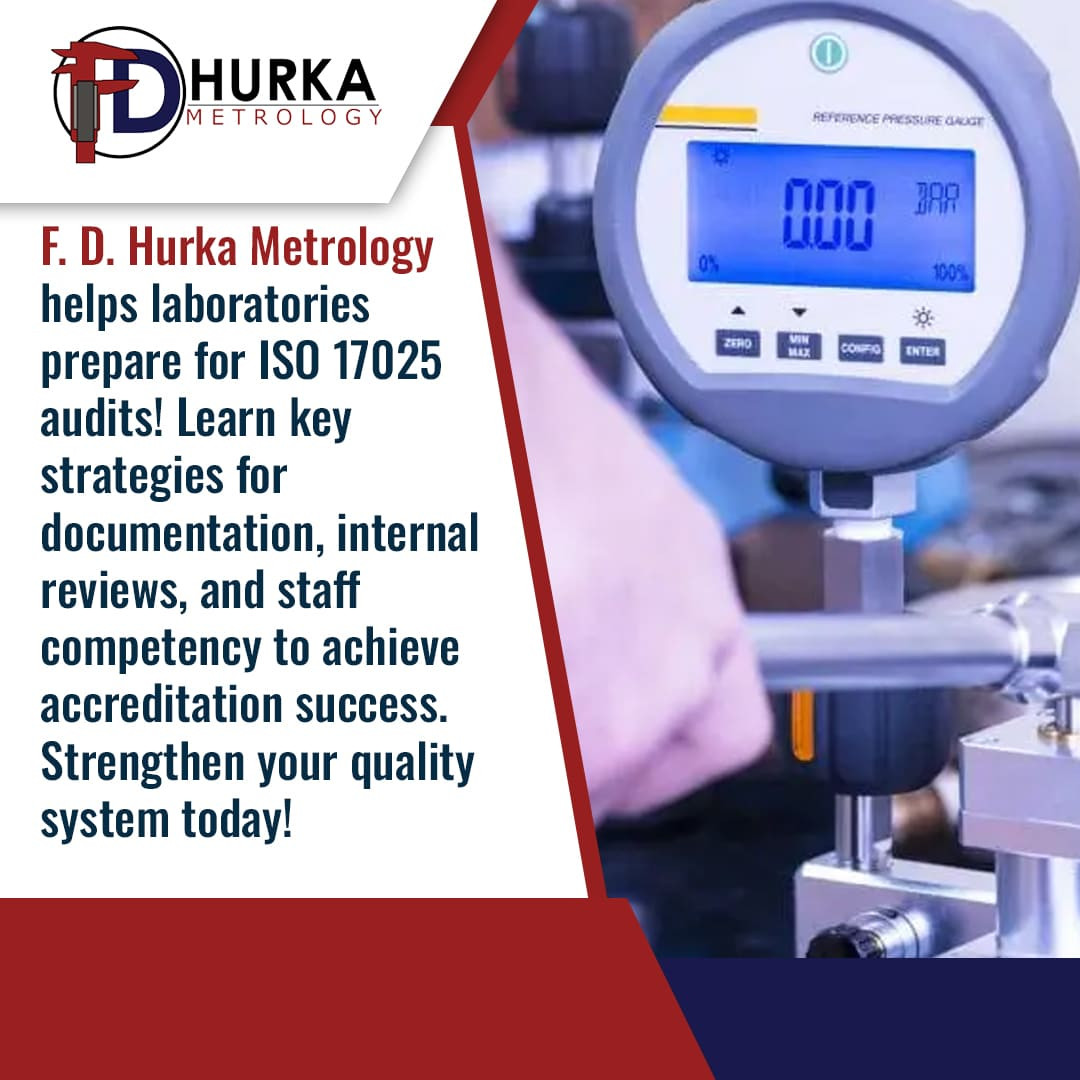Charlotte, NC–F. D. Hurka Metrology, based in Charlotte, North Carolina, has been supporting accredited calibration laboratories for more than 50 years. The company has guided countless laboratories through the ISO 17025 audit process, emphasizing that success relies on preparation. ISO 17025-accredited calibration services play an essential role in global trade, manufacturing quality, and laboratory credibility. Auditors assess laboratory competence by reviewing documentation, technical procedures, calibration records, and staff qualifications. Laboratories that demonstrate readiness reduce risks of nonconformities and delays.
Internal Reviews for Accredited Calibration Services
Preparation begins with an internal review of the laboratory’s quality management system. This includes verifying that manuals, procedures, and work instructions are current and accessible. Outdated or missing documents remain one of the most common audit findings.
A document control matrix helps track updates and approvals. Accredited calibration services require systematic document management to maintain consistency with ISO 17025 requirements.
Conducting Internal Audits in Accredited Calibration Laboratories
Internal audits are essential for identifying weaknesses before the external assessment. Accredited calibration laboratories that conduct thorough internal audits gain the opportunity to correct issues early.
Audits should cover every laboratory process within the accreditation scope. Findings often include incomplete method validation records, missing auditor qualifications, or insufficient equipment maintenance documentation. Addressing these areas before the audit improves readiness.
Common Areas of Focus for Internal Audits
Staff training and competency documentation
Technical method evaluations
Calibration interval justification and maintenance records
Accreditation body requirements review
Equipment Calibration and Maintenance for ISO 17025 Accredited Calibration
Equipment calibration programs receive close attention during audits. All instruments used for accredited calibration services must have current calibration certificates, maintenance logs, and traceability to national or international standards.
Laboratories should also document interval justifications and performance verification data. Proper records help demonstrate equipment reliability and support ISO 17025-accredited calibration requirements.
Staff Competency and Training for Accredited Calibration Services
Auditors examine staff training and qualification records to verify competence. Laboratories must keep detailed files covering education, experience, training sessions, and ongoing competency assessments.
Preparing staff for auditor interviews also strengthens audit outcomes. Personnel should understand their roles in maintaining accredited calibration services and know how to access quality system procedures.
Measurement Traceability in ISO 17025 Accredited Calibration
Measurement traceability remains a foundation of accredited calibration. Laboratories must maintain unbroken chains linking results to recognized national or international standards.
Records must include calibration certificates for reference standards and detailed uncertainty budgets. Reference standard management, storage, and protection procedures further strengthen laboratory credibility.
Quality Records and Documentation for Accredited Calibration Laboratories
Organized quality records reduce audit time and demonstrate professionalism. Laboratories must keep internal audit reports, management review minutes, proficiency testing results, corrective action records, and customer feedback readily available.
Well-maintained documentation supports compliance with ISO 17025-accredited calibration requirements and allows auditors to verify laboratory competence efficiently.
Management Review and Facility Readiness
Management review meetings should occur after internal audits and before the official assessment. These meetings address audit findings, staff development, customer feedback, and resource planning.
Additionally, the laboratory facility should present a clean, safe, and organized environment. Environmental monitoring, safety procedures, and access controls all support ISO 17025-accredited calibration readiness.
Avoiding Common Audit Preparation Mistakes
Many laboratories lose time and risk accreditation because of preventable mistakes. The most frequent issues include:
Outdated or missing documentation
Insufficient staff preparation for interviews
Weak equipment calibration records
Unclear traceability documentation
By addressing these areas early, laboratories strengthen their audit readiness and increase their chances of success.
Path to Accreditation Success with ISO 17025 Accredited Calibration Services
F. D. Hurka Metrology emphasizes that preparation is the deciding factor between accreditation success and failure. Laboratories that follow structured processes for document management, internal audits, staff training, and equipment calibration gain higher success rates during external assessments.
Laboratories preparing for ISO 17025 accreditation can benefit from professional guidance. F. D. Hurka Company offers support for documentation review, internal audit planning, and competency validation. To learn more about ISO 17025-accredited calibration services and audit preparation, contact F. D. Hurka Metrology today.




